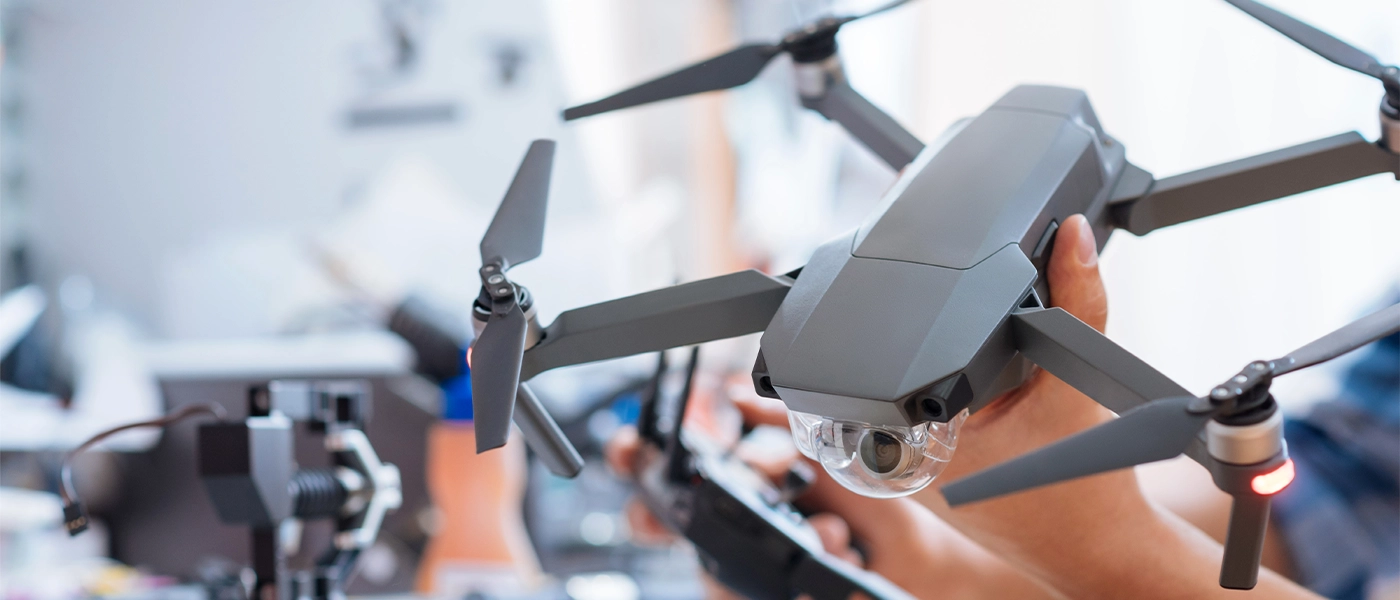Drone exam - how to prepare to pass?

Obtaining a drone operator's license is an essential step for anyone who wants to take full advantage of drone capabilities. Over the years, laws and exam requirements change. In this article, we present the most relevant information and practical tips to help you successfully prepare for the 2024 drone operator exam. With our tips, you'll be better prepared to get your certification and become an expert in drone operation.
Online drone exam - what you should know before taking it?

Online drone exam is a very popular way to get certified. Registration and training is available on the official gOV website. The advantage of online training is certainly the convenience and ability to learn and take the test from anywhere. When preparing for an online exam, there are several key aspects to pay attention to:
Safety and drone procedures
We are in the midst of regulatory changes. The location of registration and training has also changed. A new system - KSID - has been available for several months, where you can register and do basic training. We must admit that the site works very well. It is clear and comfortable. If someone has already registered before, they can import their data.
Knowledge of safe drone use and emergency procedures is essential. Before every flight, check the weather forecast. Avoid flying in poor conditions weather conditions, such as strong wind, rain or fog. Make sure you fly in permitted zones. Avoid flying near airports, prohibited zones or protected areas. You can read more about geographic zones in the article: Where to fly a drone? Map of geographical zones. Keep your drone in sight at all times. Do not exceed the maximum flight altitude - 120 meters. Fly away from people, animals and buildings to avoid collisions. You can additionally read the article: Can you fly a drone over someone's property? Before each flight, check the technical condition of the drone, including batteries, propellers and navigation systems. Regularly service your drone and repair any damage according to the manufacturer's instructions.
Don't leave it to the last minute
Drone regulations
Make sure you are up to date with current regulations. The 2024 exam will include questions on space limitations, altitude, weight of drones and legal liability of the operator. We describe all regulations extensively in the article under this link. Remember that regulations change all the time and it is a good idea to follow the changes on the official website ULC.
Drone markings and specifications
Drone pilot exam - requirements and tips

First of all, the candidate must have completed 14 years in Poland (in the European Union 16 years). The first step to take any exam is to register as a pilot. On the other hand, when it comes to the level of difficulty, the more complicated the operations, the more difficult the exam, too. Below we rearrange the exams starting with the easiest ones:
- A1/A3 drone exam is free and can be taken an unlimited number of times. Takes place online on the KSID website (previously drones.ulc). It is available in the panel after registering as a drone operator. This is the easiest exam, and after passing it, the A1/ A3 certificate is immediately available in the system. It is designed for drone operators weighing up to 25 kg, flying in urban areas (A1) and away from people (A3). It is important to understand the regulations regarding minimum distances from people and buildings.
- The A2 exam can be taken entirely online, but is organized by certified nurseries. The theoretical exam can be taken at testing entities designated by the Civil Aviation Authority (List of Examination Entities). The cost of the exam ranges from PLN 50 to 200. Before taking the A2 exam, it is necessary to pass the A1/A3 exam. Registration for the exam is done by phone or online. After registration, you receive study materials, and the theory exam itself is conducted online, often using a webcam. The results of the exam are usually given as soon as it is completed. A2 drone exam allows you to fly closer to people and requires additional knowledge of risk assessment and safety management. When taking the theoretical exam, you must submit a written statement of your practical skills, acquired through a course at a certified training provider or through self-study. Entitlements are registered in the Pansa system in about 7 days, although the process can take up to 30 days maximum. If you fail the exam, you will need to purchase access to the exam again.
- Special category exams, held at nurseries, include NSTS ranges 01 through 05 and STS-01 and STS-02. The exam consists of a theoretical part, which, depending on the nursery, can be conducted on-site or via an e-learning platform. Access to theoretical materials is provided for a period of 5 to 12 months. After completing the theoretical training, a trial theoretical exam is held. This is followed by practical training, which lasts between 4 and 12 hours, and is followed by a practical exam. The specific rules may vary from nursery to nursery and from one type of training to another, so it's worth checking the details on websites or directly with the nursery in question. If you fail the exam, you will need to purchase access to the exam again.
Preparation for the exam involves several stages:
- Familiarization with exam materials
- Practice with a drone
- Sample Tests: Solving sample tests
Drone exam - sample questions and answers
When preparing for the exam, it is a good idea to familiarize yourself with sample questions that may appear on the test. These can be questions not only about the law, but also about technical and aeronautical dilemmas. Here are some examples:
What is the allowed maximum flight altitude of a drone?
Answer: The maximum allowable flight altitude in Poland is 120 meters above ground level (AGL).
Are flights over gatherings of people allowed in the open category?
Answer: In the open category, such flights are prohibited.
What are the current labeling requirements for a drone weighing more than 250 grams?
Answer: The drone must be marked with a unique identification number and have valid liability insurance.
Describe the VLOS pass-through procedure and give an example of a situation in which it can be used.
Answer: VLOS means flying within line of sight of the operator. Example: high-voltage line inspection, where the operator controls the drone, keeping it in sight throughout the flight.
What is the most important emergency procedure in case of loss of radio range with a drone?
Answer: The drone should automatically return to the takeoff point or land safely according to the programmed emergency procedure.
Thorough preparation on key topics will increase your chances of successfully passing the 2024 drone exam.
Summary
Earning a drone operator's license is a groundbreaking step for those looking to take advantage of the full capabilities of drones. Online exam provides convenience and flexibility for learning. Before proceeding, however, it's a good idea to familiarize yourself with current drone regulations, especially considering space restrictions, signage and safety procedures.
Safety is key in drone operations, so knowledge of safety rules and emergency procedures is essential. You should also remember to prepare for the exam, which includes familiarizing yourself with the exam materials, practicing with the drone, and solving sample tests.
Passing the drone operator exam requires a considerable amount of knowledge in various areas, such as legislation, safety, and technical specifications. Therefore, thorough preparation of these issues will increase your chances of successfully passing the exam. Good luck!
